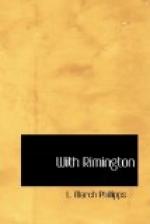Left and right of you, your two or three flankers, half a mile off, have halted, in obedience to your halting, and are standing by their horses’ heads scanning the country. Under the kopje your main body are sitting about, while their ponies, with bridles thrown over their heads, graze. Far back, two or three miles, the bits of dark kilt showing behind their khaki aprons, a company of the Camerons comes into view, the brown colour so exactly matching the plain that they are first visible only by their motion. Here come the flank guards, sprinkled far out over the country. And now, at the point where the distant kopjes slope to the plain, the air grows heavy with dust-wreaths, rising like steam from a cauldron, and underneath, slowly emerging, comes something dark and solid. It is the head of the column. The great caterpillar is crawling forward. You must push on—“Stand to your horses!”
LETTER XX
PRINSLOO’S SURRENDER—I
CAMP, NEAR FOURIESBERG, July 26, 1900.
We have a whole day of peace and rest before us—very welcome after the hard fighting we have been doing lately. This lull is to allow Bruce-Hamilton and Macdonald to stop the exits at the eastern end of the valley. We don’t want to push the enemy east till we are sure the passes in that direction have been secured. Some of us are annoyed at the delay. We were in touch with the enemy this morning, our scouts and advance guard exchanging shots with their rearguard. We could see them prancing about on the bare hills east of Fouriesberg, and making off in a leisurely way up the eastern valley, and most of us were quite expecting that we should give chase immediately.
Hunter rode forward to have a look. He watched the tiny horsemen hovering on the hills or cantering away; then back he came with a quiet smile on his face, and instead of ordering the advance, as the impetuous ones expected, he led his column back over the way we had come for several miles, and then camped.
So here we are, sitting or lying about, sleeping, smoking, or reading. Our camp is in a small plain, five or six miles from Fouriesberg, surrounded by ranges of great hills. Those south and east, their gaunt peaks rising, streaked with white, above the lower and nearer ones, are in Basutoland. They play an important part in our programme, for it is against that huge barrier that we are pressing the Boers. There are some rounded, turf-clad hills, but most are rocky. Sharp points and stony ridges rise up with jagged and clear-cut outlines into the sky, with gorges and valleys retreating in between, full of deep blue shade, and often horizontal bands of strata, showing like regularly built courses of white masonry along the flanks of the mountains. It is very fine, though gaunt, bare, and untenanted. We have had nothing but level veldt to march on for weeks past, and the change to the eye is a pleasant one. Nevertheless, it is a bad country for our business. To us mountain ranges are not fine scenery, but strong positions; and rocks and crags are not grand and picturesque, but merely good cover. We always serve out extra-ammunition when we come to a pretty bit of scenery.




